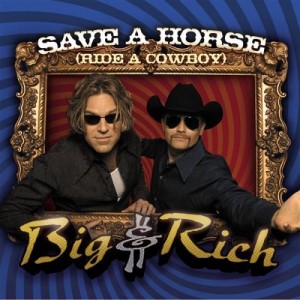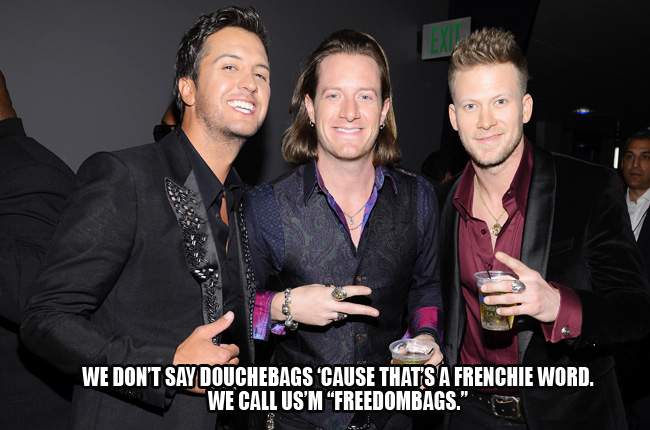 I get an almost perverse level of glee from reading the reviews and meltdowns stemming from the movement known as bro-country. Watching a lover of true country music climb the walls over acts like Jason Aldean and Florida Georgia Line is, indeed, a form of schadenfreude. Reading the articles wherein fictional accounts of long-dead legends of American music rise from graves to slaughter good ol’ boys in pickup trucks, who are drunkenly trying to peel painted-on jeans off their girls down by the crick at the end of an ol’ dirt road, make me giddy.
I get an almost perverse level of glee from reading the reviews and meltdowns stemming from the movement known as bro-country. Watching a lover of true country music climb the walls over acts like Jason Aldean and Florida Georgia Line is, indeed, a form of schadenfreude. Reading the articles wherein fictional accounts of long-dead legends of American music rise from graves to slaughter good ol’ boys in pickup trucks, who are drunkenly trying to peel painted-on jeans off their girls down by the crick at the end of an ol’ dirt road, make me giddy.
As a long suffering rock fan who had to swim through the feces-strewn creek of hair metal’s back quarter, pickle-mouthed alt rock sad guys, nu-metal, Nickleback, Train and Maroon 5 (admit it: they’re dreadful), there is something warming and comforting — like urinating in one’s own scuba suit — about seeing bro-country’s rise and the hyperbolic reaction to it.
That’s not a defense of the bros, mind you. They suck as badly as charged. Most haven’t met a cliche they haven’t sodomized, and their audiences who delight in the “don’t have to think about it” trappings seem more than willing to stand around, drink bad beer, and watch the buggery take place.
”Got on my smell good.
Got a bottle of feel good.
Shined up my wheels good.
You’re looking real good.”
Country, like rock, is well-suited for this very basic distillation, as both genres have defiantly held onto those cliches and stereotypes. You can’t make a joke about the country tune where the poor dope is lonely and brokenhearted again, drunk again, or suffering the consequences of being lonely and drunk again, unless there is some truth in the existence of these. Those same tropes are all applicable to the worst of rock, except that rockers tend to get really, really angry about it, and will often channel that anger into trying to pick up strippers for extra-curricular “spotless mind” sex.
What is really riling up the country set, and justifiably so, is the absence of story-telling in these songs. Unfair though it may be to elevate Carrie Underwood’s “Before He Cheats” as a positive exemplar, it nonetheless puts a visualization in your head of an event in a clearer way than, say, a “hell yeah” anthem like Gretchen Wilson’s “Redneck Woman.” Yet both of these are practically “American Pie” next to the doggedly dumbed-down ‘Murrican found in the bro-country movement.
I tend to blame Big & Rich’s “Save A Horse, Ride A Cowboy” for starting this mess, but most of that is a projection of my dislike for that song. While the dopey lyrics of the tune certainly stride in the — is there such a single thing as a single-entendre? Is it just ententre? Or is it just thinking with your junk? — there isn’t much more that locks the tune down as the grandfather of this movement; not any less than Faith No More’s “Epic” being a progenitor of Limp Bizkit’s “Nookie.”
 So why is bro-country so popular? Like most pop music, the popularity has nothing directly to do with quality of content. The stars of this form are rather cookie-cutter also. Most of the guys are buff dudes who want to get laid and drunk, not necessarily in that order. The women in this type (and there are very, very few) are little more than the temporary adornments of backseats and truck bed liners, elevated from short-shorts wearing barmaids to goddesses of desire and possession, and they like it that way. There are no deep thoughts in the lyrics because there are no deep thoughts in the types themselves.
So why is bro-country so popular? Like most pop music, the popularity has nothing directly to do with quality of content. The stars of this form are rather cookie-cutter also. Most of the guys are buff dudes who want to get laid and drunk, not necessarily in that order. The women in this type (and there are very, very few) are little more than the temporary adornments of backseats and truck bed liners, elevated from short-shorts wearing barmaids to goddesses of desire and possession, and they like it that way. There are no deep thoughts in the lyrics because there are no deep thoughts in the types themselves.
The fans project themselves into these celebrities and live vicariously through these sordid fortune cookie narratives. For them, the hookup at the end of the evening is the end of the story, much like the hookup after the frat house party. It is a YOLO/Tindr supernova to forget that, although there will be a tomorrow, it won’t be pretty. Like most escapist fare, the bro-country variant has sprung up from tough socio-economic seeds. Hair metal rose in the mid-to-late 1980s under levels of massive financial inequality in the embrace of trickle-down economics, as well as the “no tomorrow” fear under the shadow of the nuclear arms race. The music fed the dopamine urges of an audience that was never going to see success that would afford them the kind of wild, high-life nights of these stars. Motley Crue and Whitesnake provided a vision of glamor, albeit a seedy version of it, that fulfilled basic needs for teens and young adults at the time — get out of your head at all costs. Don’t think about tomorrow.
In hip hop you have the club bangers, the booty, the handful of bills to throw in the air to make it rain. You have the fine liquors that flow all night and can’t stop, won’t stop. These songs are meant for the club because outside of the club, there’s reality. And it is brutal.
That’s why bro-country has taken such a deep bite into the popular music landscape, and why even under the protests of the old guard who were often as responsible for walowing in southern sins, it continues to find an audience. This music provides pleasure without emotion, attachment, or consequence. It is the celebration of the one-night stand smack in the middle of it, without repercussions. There are no layoffs in bro-country, no fears of how you’re going to pay for the gas, car payment, or insurance on that big ol’ truck of yours. There is no yearning for escaping that small town with that college degree, because there are no jobs available for that degree. Bro-country isn’t concerned about student loans. It doesn’t ponder the moral implications of getting the girl so drunk she can’t hardly see straight, and cannot determine whether she actually consented or not the day after.
Bro-country is not worried about the day after, or ethical stances, or cirrhosis of the liver. It is all bang, no crash.
So why do I get such a laugh from reading the complaints about this, especially when I find the music so corrosive? I suppose it is the childish “told you so” attitude of having heard one side slag another side all these years in categories of authenticity, and integrity, and what is capital-g Good music. Having had relatives who enjoyed their country music, and regularly called the music I liked crap without even listening to it, there is the briefest of vindications found. The truth is that I did listen to some crap. And as I mentioned earlier, thanks to the hang-dog, horn-dog, drunken slob mainstays of some country music since its inception, so did they. To hear some of these individuals admit that, whoa, this is really, really bad, is a small victory.
I don’t believe we will see the other side of this where enlightenment reigns; where rock, rap and even country reach a new peak of creativity and expression; or something is put out that is as intense and affirming 20 years from now as it is the day it is released. So long as our realities are as difficult as they are, and we rely on mindless escapism to give us a reason not to crawl back into bed with boxes of chocolate covered donuts, we’ll have surface noise that fulfills those desires. Until then, it will only be more records “dropping,” like waste in a backwoods outhouse.






Comments